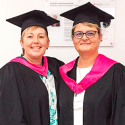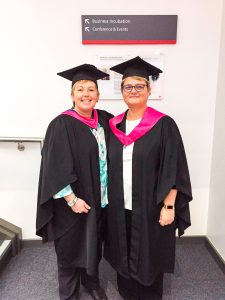The names of the foster children have been changed to protect their identity.
‘We are happy because they are happy,’ says Ashley who gave up his job to foster twin boys with autism. ‘We say this is our family and we feel really close to them. We call them our boys.’
The twins came into residential care with Progress when they were 11 years old, following a foster care placement that had broken down.
Oliver struggles with social understanding and empathy. James is non-verbal and has more severe learning difficulties.
Oak Cottage became their home for the next few months
They settled in very quickly,’ says Margaret Hopkins, formerly residential manager at Oak Cottage and now Operations Manager for Progress’s residential services.
‘They made massive improvements while they were here with us.
James, who was incontinent, was learning to use the toilet. He started making sounds and was communicating using pictures. Oliver grew in confidence. He was cheeky and mischievous and loved to dress up as a superhero.
‘It was lovely to see how they were growing with us,’ says Margaret who fostered more than 100 children before she started working for Progress.
Finding Foster Carers
Meanwhile, the Progress residential and the fostering team were working together to identify the right foster carer.
‘We were looking for robust, resilient people,’ says Tina Bhardwaj, The Operations and Registered Manager for the fostering service at Progress.
They chose Ashley and Toni.
During the first meeting with the boys, Ashley felt nervous. Oliver stroked Toni’s shoulder and smiled at her. James ran into the garden and onto the swing.
‘They were just so caring and happy, and the staff only had positive things to say about them,’ says Ashley.
The couple started making plans immediately to put bunk beds in their spare room, they knew they wanted to give the boys home.
Ashley decided to give up his job as a senior autism practitioner so he could look after them.
The Transition Phase
During the next few weeks, they saw the boys regularly, first under supervision, then taking them out for a pizza or a walk or to their home alone.
The transition between the residential home and the foster home was like an adoption transition. Progress makes sure there are key people following the child through its journey, supporting them and making sure their wishes and feelings are heard.
‘It went really well,’ says Margaret.
An excited Oliver used to watch from his bedroom window at the residential home, looking for Ashley and Toni when they were due to arrive.
‘The bond with them was absolutely brilliant, you could see that,’ says Margaret.
‘The children and the carers had chemistry between them,’ says Tina. ‘The carers made all this effort to learn about the children, they created a bond with the children. It became apparent that this was a good match and this was going to be the right placement for the children.’
When the boys left Oak Cottage for their new home, Margaret says it felt like a relief that they had somewhere they were going to be loved and nurtured.
‘It was a really positive ending for the children,’ she says.
A Loving Home
Before long the family moved house so that the boys could have a bedroom each. Oliver chose red and black for his room and picked the accessories for his shelf. James, who loves to swing and to balance, has a swing in the middle of his bedroom, attached to a beam, he has laser lights and a sensory corner with toys and mirrors and cushions. In the garden, he has swing chairs, and hammocks and a trampoline.
The couple has seen massive changes in the boys since they came to live with them.
James’ behaviour has improved. ‘He showing he is really comfortable in his environment,’ says Ashley.
Oliver’s behaviour has improved too. ‘He is such a pleasant lad, so polite and so caring towards others,’ says Ashley. He says he loves his foster family.
Oliver is learning to cook at home, has piano lessons, and goes to a youth club. He is also sporting a spikey new haircut which he chose himself and has learnt to swim. James who wouldn’t even go into the water before now doesn’t want to get out of the pool.
It took James longer than Oliver to hug Ashley and Toni because of his disability but now he sits on the sofa and cuddles, and he waits for a hug with open arms.
Progress provides foster carers with training. They have support groups and supervision with a supervising social worker.
Tina says fostering for the twins has been ‘an absolute success,’
‘Every child deserves to live in a family setting,’ she says. ‘Every child deserves to have a quality family life.’
Inspired to become a foster carer? Click here to learn how you too can change a child’s life. If you would like to talk to us, email fostering@progresscare.co.uk, and we will be happy to help.







